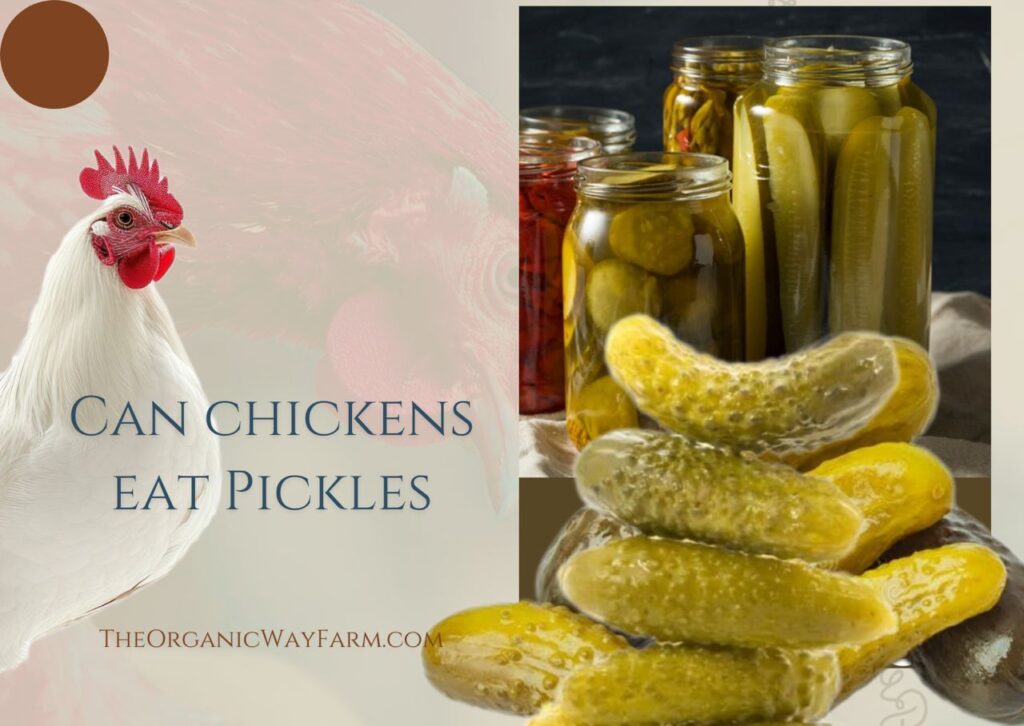If you have ever wondered about the diet of chickens, you are not alone! Many chicken owners are curious about what kinds of human foods their feathered friends can safely enjoy. One question that comes up quite often is, “Can chickens eat pickles?” It’s a great question and worth exploring, as chickens tend to be curious eaters.
The short answer is YES, chickens can eat pickles, but there are important factors to keep in mind when doing so. Pickles are made from cucumbers, which are not harmful to chickens. However, the pickling process may add ingredients that might not be the best for them. So, how do we ensure that our chickens enjoy pickles safely?
Did you know that chickens not only need a balanced diet but also enjoy a variety of treats? So, in addition to discussing pickles, we will touch on how to feed them this crunchy snack, the nutritional benefits and risks, and some alternative foods that might be healthier for our chickens.
- Can Chickens Eat Pickles?
- How Much Pickles Can Chickens Eat?
- Best Ways to Feed Pickles to Chickens
- Benefits of Feeding Pickles to Chickens
- Risks and Dangers of Feeding Pickles to Chickens
- Substitutes for Pickles for Chickens
Let’s explore this topic together!
Can Chickens Eat Pickles?

Chickens can indeed enjoy pickles, but moderation is key. Understanding the composition of pickles is vital. Most pickles are cucumbers that have been preserved in vinegar, salt, and various spices. While fresh cucumbers are perfectly fine for chickens to consume, pickles often have added ingredients that could affect their health.
The high sodium content in pickles can be a concern. Chickens are small animals, and too much salt can lead to health problems, including dehydration and kidney issues. It’s best to provide pickles as an occasional treat rather than a regular part of their diet. Picking out simple, less salty varieties can also help minimize risks.
How Much Pickles Can Chickens Eat?
Like any treat, pickles should be offered in moderation. A small piece of pickle every now and then will not harm your chickens. Think of it as an occasional snack. If you want to share this crunchy delight, start by offering only a small piece, about the size of a grape, and watch to see how they react.
It’s critical to balance the rest of their diet with grains, seeds, and vegetable scraps. These should make up the bulk of their daily intake, while pickles can be a fun addition from time to time. Make sure that whatever you offer, including pickles, complements their primary feed, ensuring they still receive essential nutrients.
Monitoring their behavior after they eat pickles can provide insight into their tolerance for this treat. If they seem fine, you can continue to provide small amounts occasionally, but if you notice any discomfort or changes in behavior, it’s best to reduce the amount or eliminate pickles from their diet altogether.
Best Ways to Feed Pickles to Chickens
Feeding pickles to chickens can be a fun event for both you and them. Cut the pickles into manageable, bite-sized pieces to prevent choking. Ensure that the pickles are not overly salty or flavored. Diluted pickles made with vinegar and fewer spices are often a better choice.
Consider offering pickles alongside their usual feed. Mixing small pieces of pickle with their grains can make it more appealing. Chickens are social creatures, and sharing snacks with them can create a positive bonding experience. You could even make a game of it, tossing the pieces into their run and allowing them to scavenge for treats.
Another creative way to share pickles is by creating a “treat block.” You can mix diced pickles with other vegetables or grains, and freeze them into a block. This could serve as a fun puzzle that challenges your chickens, keeping them entertained while also letting them enjoy the snacks.
Benefits of Feeding Pickles to Chickens
Hydration
Chickens can benefit from the high water content found in cucumbers, even when pickled. Proper hydration is essential for overall health. While pickles aren’t as hydrating as fresh fruits and veggies, they do provide some moisture, which can be helpful during hot weather. Keeping our chickens hydrated is vital to their well-being.
Fiber
Fiber is crucial in supporting chicken digestion. Pickles, derived from cucumbers, contain a decent amount of fiber, which can aid their digestive system. Including fibrous treats helps keep their gut healthy, promoting proper digestion.
Vitamins and Minerals
Pickles contain some vitamins and minerals, primarily if you use cucumbers as the base. Cucumbers have small amounts of vitamin K, vitamin C, and other essential nutrients. While they shouldn’t replace the primary nutrients from their feed, offering pickles occasionally can provide variety and some added benefits.
Mental Stimulation
Chickens are curious animals, and offering them different foods can stimulate their minds. Providing pickles can inspire exploration and excitement in their environment. Activities like foraging and pecking keep them active and engaged, which is essential for their mental health.
Nutritional Breakdown of Cucumbers
If the cucumbers are pickled simply, they can offer value to the diet. Cucumbers are low in calories and high in nutrients. They are primarily composed of water, making them great for hydration. By choosing pickles made with minimal additives, they can be a small yet enjoyable addition to the chicken’s diet.
Risks and Dangers of Feeding Pickles to Chickens
Feeding pickles to chickens does come with risks that we must consider. As mentioned, pickles usually contain high amounts of sodium due to salt being used in the pickling process. Too much sodium can lead to severe dehydration. We have to be cautious about how much we give them.
Moreover, many pickles contain spices or preservatives that might not be suitable for chickens. Garlic, onion powder, or other strong spices can be harmful and should be avoided entirely. Always check the ingredient label if you decide to buy pickles from the store.
Another concern is the potential for pickles to disrupt a chicken’s digestion. If they consume too many pickles, chickens might experience issues such as diarrhea or other digestive troubles. Watching your hens for signs of distress after introducing new foods can help spot any issues quickly.
Always ensure that whatever we feed is safe for our flocks. Picking the right treats for our chickens is important, and being cautious with pickles is essential for keeping them healthy.
Substitutes for Pickles for Chickens
If we’re hesitant about offering pickles due to the risks, there are plenty of healthier substitutes chickens can enjoy. Fresh fruits and vegetables like carrots, apples, berries, and leafy greens are nutritious and safe for chickens. These items offer vitamins and minerals without the added risks found in pickles.
Another great option is to feed them plain cucumbers without any pickling. This way, they get the hydrating benefits and fiber without the downsides. Occasionally, offering cooked squash or pumpkin can also be a delectable treat that provides nutrition while being easy to digest.
Keeping things fresh and varied in their diet encourages good health and can satisfy their natural curiosity. We can create a balanced diet that enhances their enjoyment without the downsides of less healthy options. Experimenting with different fruits and veggies can lead to discovering what our chickens love the most.
Frequently Asked Questions
Can chickens eat other pickled vegetables?
Some pickled vegetables can be harmful due to high sodium or spices. It’s safest to stick with fresh or simple pickled options without additives.
What can I do if my chicken eats too many pickles?
If a chicken has consumed a lot of pickles, monitor them closely for signs of distress. Ensure they have abundant water available to help combat dehydration. If you notice worrying symptoms, consult a veterinarian.
Are there any vegetables chickens can’t eat?
Chickens should not eat nightshade vegetables like potatoes and tomatoes in significant amounts. These contain solanine, which is toxic to them.
Do chickens prefer fruits or vegetables?
Chickens often enjoy both equally, but preferences can vary. Some chickens may lean toward sweeter treats like fruits, while others love crunchy veggies.
Can feeding pickles result in health issues for chickens?
Yes, because of the high salt content, frequent pickle consumption can lead to health issues, including dehydration. Always provide in moderation.
Final Thoughts
Feeding our chickens can be a delightful experience, full of learning and bonding. While they can eat pickles, it’s crucial to be mindful of what we give them. Focus on moderation, monitor their health, and ensure they get a well-rounded diet. If you want to introduce pickles, start small and observe how they react.
For other fruits they may enjoy, consider checking out can chickens eat grapes? which outlines a safe and healthy addition to their diet.






